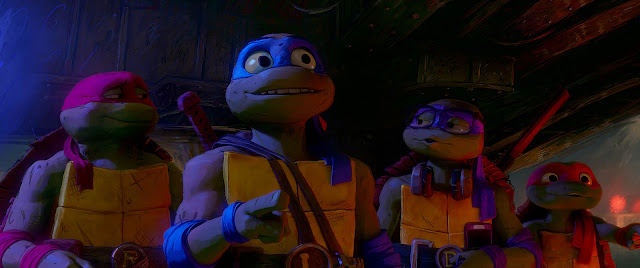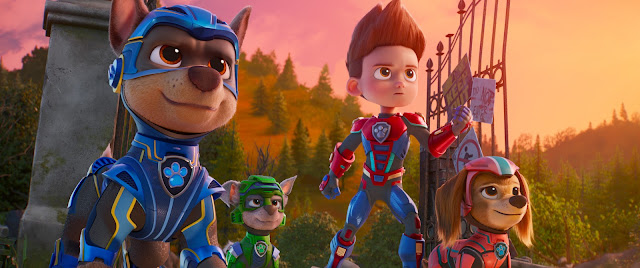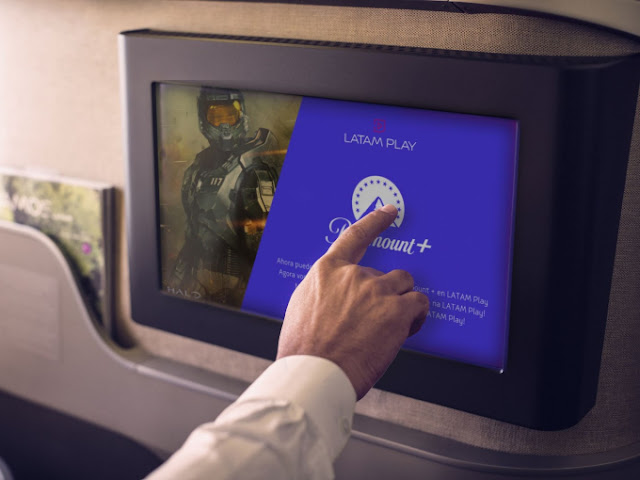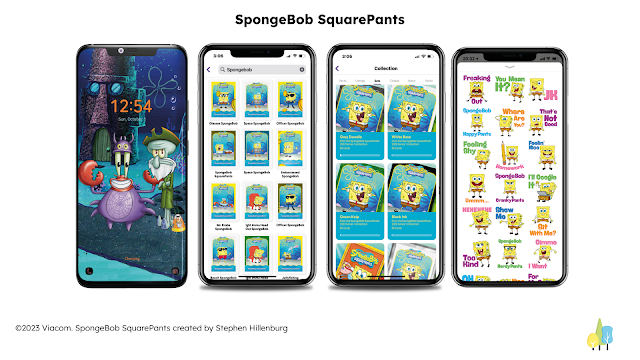Brian Robbins reveals he fought to make Teenage Mutant Ninja Turtles: Mutant Mayhem and the PAW Patrol movies.
 |
| A still from “Teenage Mutant Ninja Turtles: Mutant Mayhem.” (Paramount Pictures) |
Earlier this summer, a set of five frozen pizza boxes began populating the freezers at Walmart. But DiGiornos these were not; these pizzas featured the masked visages of the world’s most famous crime-fighting turtles.
From July to December, 1.2 million boxes of TMNT-branded frozen pizzas, costing about $6 a pop, were sold in the U.S. Reviews popped up on YouTube, Reddit and TikTok as fans collected the boxes and debated the turtle-topping pairings: Is Raphael a sausage pepperoni kinda guy? Should Leonardo be plain cheese?
The pizzas were one element of Paramount’s marketing and consumer products blitz for this year’s Teenage Mutant Ninja Turtles: Mutant Mayhem, the first theatrical Turtles film since 2016.
For top executives at Paramount, the successful revitalization of the TMNT brand wouldn’t just take ticket sales. Instead, Paramount sought to create an overarching strategy crossing consumer products and experiences to help make Mutant Mayhem feel like the start of a new Turtles era — winning over old and new fans to watch the films and shows, buy the toys and, of course, eat lots of pizza.
“We’re not just making movies to sell toys,” said Paramount Pictures and Nickelodeon President and Chief Executive Brian Robbins in an interview with the
Los Angeles Times at the Paramount Pictures studio lot in Los Angeles. “We’re making movies to make great movies. And if we make great movies, for that audience, for that demo, with properties that have proven play patterns, then the rest will come.”
 |
| Raph, Leo, Donnie and Mikey in “Teenage Mutant Ninja Turtles: Mutant Mayhem” (Paramount Pictures) |
From Paramount’s perspective, the plan worked. Mutant Mayhem grossed a decent $180 million at the box office on a $70 million budget. The TMNT franchise is projected to drive $1 billion in retail sales, driven by products like the frozen pizzas and Mutant Mayhem action figures from longtime TMNT toy maker Playmates. That’s a spike coming after the modest prior $10 billion in lifetime sales from the 39-year-old TMNT franchise.
Paramount replicated this strategy with its preschool-focused sequel
Paw Patrol: The Mighty Movie, which grossed $195.6 million worldwide from a $30 million budget and boosted Paramount+ viewership. Retail sales of Paw Patrol–themed items (think: toothbrushes, Crocs, pajamas and books) generated roughly $1.5 billion, helping Paramount bring in $2.5 billion in retail sales from TMNT and Paw Patrol this year.
Those figures, generated by just two titles, pale in comparison to the billions brought in by consumer products behemoth Disney, which drove $61.7 billion in global retail sales during 2022, according to a report from
License Global. But Paw Patrol and TMNT are wins for Paramount, whose theatrical animation business has long struggled. Though Paramount Animation’s first movie,
Rango, won the 2012 Oscar for animated feature, many of its subsequent releases, such as
Sherlock Gnomes and
Wonder Park, weren't quite as successful.
Paw Patrol: The Mighty Movie and Mutant Mayhem are feathers in the cap for Robbins, who was tapped to lead the film studio in 2021 after holding top positions at Paramount Players and Nickelodeon.
The animated success came in a year when some of Paramount‘s big swings, including Dungeons & Dragons: Honor Among Thieves and Mission: Impossible — Dead Reckoning Part One, disappointed theatrically. For the first nine months of 2023, Paramount’s film segment posted an operating loss of $143 million.
Since taking the reins, Robbins has zeroed in on franchises to build up the studio, which has been caught up in Paramount Global’s last decade of separations, mergers and shakeups. The saga continues today, as owner Shari Redstone reportedly considers selling a controlling stake in National Amusements, which owns the majority of Paramount Global’s voting shares.
Along the way, Paramount will again use its marketing prowess to juice its consumer products and experiences division (think: coffee, clothes and pet products for Mean Girls fans tied to upcoming live-action movie musical; drinkable yogurt, branded toothbrushes and games for the Paw Patrol and SpongeBob set).
“We talk constantly about what’s happening in the film business, we talk about release dates, we talk about marketing, and it is a really collaborative approach when it comes to franchise films like Turtles and Paw Patrol,” said Pam Kaufman, president and CEO of international markets, global consumer products and experiences for Paramount.
“Our retailers and licensees ... know when they’re partnering with Paramount, not only are they partnering on a show and a film... that translates into great products,” Kaufman said. “Our company will get behind it across all platforms and all markets.”
 |
| A still from “Paw Patrol: The Mighty Movie” (Paramount Pictures) |
Robbins said he had to fight to get the first Paw Patrol movie and Mutant Mayhem made, lobbying and getting the support of Paramount Global Chief Executive Bob Bakish when others didn’t see the theatrical potential for preschooler and teen fare. At one point, Robbins — prior to leading the studio — was so dead set on making the TMNT film that he remembers thinking he’d find another partner to make the movie with if Paramount passed.
“I would say to Bob Bakish, ‘I’m doing it,’” Robbins recalls. “He would say, ‘Let me talk to the studio.’ Then the studio would go, ‘We shouldn’t do it. I don’t want to do it,’ ... and I’d be like, ‘No, I’m doing it. I’m doing it. I’m already doing it. You can’t stop me from doing it.’”
The emphasis on animated franchises isn’t a coincidence. The longer production time helps the studio space out sequels to help build excitement and avoid audience fatigue. And given Paramount’s past animated flops, the focus on existing IP is a safe bet as original animated movies like Disney’s Wish struggle at the box office.
“There’s one school of thought that audiences want more of the things they love,” Robbins says. “But they love the things they do because they’re good, so it goes hand in hand. And if the audience has a bad experience, they move on, right?”
As an example, Robbins points to TMNT, which needed a reboot after Michael Bay’s 2014 and 2016 films featuring turtles that looked more like ‘roided-out vigilantes than children’s action heroes. Robbins says he sought the advice of longtime TMNT toy maker Playmates. Their main suggestion? Ditch the live action and go back to animation.
From there, Robbins and Paramount Animation and Nickelodeon Animation President Ramsey Ann Naito thought of Seth Rogen, who they had a hunch was a TMNT fan.
“I picked up the phone right then and then I called Seth and I was kind of sheepishly like, ‘Hey, man, were you ever a Turtles guy?’” Robbins says. “He just talked for 45 minutes straight. And the next day, literally the next day, he and his partner were in our studio at Nickelodeon in Burbank.”
In addition to balancing out its star-studded cast with young newcomers to voice the main leads, Mutant Mayhem felt like an homage to the original cartoons while still being stylistically distinct and different for audiences, according to David Neumann, a former CAA agent who now runs animation production company Newmation.
“I actually really appreciate what Paramount was going for in terms of trying to reinvent themselves and do an interesting style,” Neumann says. “It’s showing overall that audiences want something that’s new and that’s fresh.”
He also commended Paramount for being able to do Mutant Mayhem on smaller budgets than $200-million animated projects like Disney’s Wish and Pixar’s Elemental.
If Paramount plays its cards right, Neumann says, the franchise successes should give the studio more freedom to take risks with new stories. But the animation executive worries that Paramount’s franchise plans will come at the loss of investments toward new, untested storylines and characters that aren’t guaranteed hits but may become the next big thing.
“[Studios are] afraid of producing originals that already don’t have the built-in audience because they can lose out on their investment, and I respectfully disagree with that,” Neumann says. “It’s not to say you shouldn’t be doing that. But it’s not to say that you should only do it. And unfortunately, I think that is what they’re going to be doing for the near future.”
For film buffs who cringe at the sight of so many sequels and remakes, Robbins says the quality is there.
“Even with Paw Patrol, you might say, ‘Oh, it’s preschool property,’ but that first movie was loved,” he says. “We exceeded people’s expectations of what they thought a Paw Patrol movie could be. We exceeded people’s expectations on Turtles from the quality of the movie.”
Remembering these Ninja Turtles are still teenagers is the key to ‘Mutant Mayhem’
The filmmakers’ mandate was clear: To put the “Teenage” back into these Mutant Ninja Turtles.
Jeff Rowe, director of “Teenage Mutant Ninja Turtles: Mutant Mayhem,” says, “I was never super into superheroes as a kid, Spider-Man excluded, because I couldn’t relate to the billionaire in a mansion with the dead parents or the man who was just born the strongest person in the universe. But there’s something about an actual teen, a kid like me, that seems flawed like myself, that becomes not only relatable, but also easy to root for. It was such a wonderful entry point that [co-writers and co-producers Seth Rogen and Evan Goldberg] gave this version of the film.”
Counterpoint: “I relate only to invincible super gods,” says Goldberg, presumably speaking from his Fortress of Solitude. “No, yeah, for Seth and me, we have an unofficial rule to always be making a high school movie, since that’s what gave us our big start,” adds Goldberg, who with Rogen was behind “Superbad” and “Joy Ride,” among others.
“We love the Ninja Turtles, but you could just tell it was a bunch of men doing kids’ voices. Especially with the Michael Bay[-produced] ones where it’s like these hulking, ‘roided-out 35-year-olds and we were just like, ‘Everyone leans into the “ninja” or the “mutants,” but they never lean into the “teenage.” ’ “
“Mutant Mayhem” is the seventh TMNT film, completely rebooting the franchise. That teen focus transforms it in the same way the Marvel Cinematic Universe’s “Spider-Man: Homecoming” transformed that super-franchise. Their novice-level heroics add a level of vulnerability not present in the other TMNT movies, just as teenage Spidey taking a climactic beatdown at the hands of a mature Vulture in “Homecoming” felt far more serious than any of his fights in the previous Sony movies.
There’s a high-school element (including changing human friend April, voiced hilariously by Ayo Edebiri, from their intrepid Lois Lane to a high-school journalism student). Their relationship with overprotective dad Splinter (Jackie Chan) becomes much more important. And casting Chan inspired the filmmakers to create a bona fide Jackie Chan fight scene for Splinter in the martial arts icon’s signature action-comedy style.
The dead-on voice casting benefits from seemingly endless cameos by Rogen and Goldberg’s famous friends, including Paul Rudd, Rose Byrne, Natasia Demetriou and Hannibal Buress as various mutants. Ice Cube drops the mic in a dominating — and very fun-sounding — turn as the big bad, Superfly.
And of course, they cast younger actors as the turtle brothers and let them riff together in the studio to create a convincing brotherly bond.
“You can’t do teenagers’ dialogue without having them overlap, make fun of each other, call-back pop culture things; it would read false,” Goldberg says. “So we made sure to have them record together. There’s some jokes [they improvised] that are some of the best jokes in the movie. It was just them goofing around together.
“ ‘Bacon, egg and cheese.’ I can’t believe that happened. I think Seth was like, ‘Do an impersonation of a New Yorker,’ and then they did that for two and a half minutes. We just took that and put that in the film. It’s a single shot animated by two heroic animators and it’s un-writable comedy. You could never put that in a script and get that to work.”
That accent on youth is also expressed in the film’s odd visual template, which resembles rough sketches animated with 3-D depth. Rowe, who co-directed the similarly irreverent and lively “The Mitchells vs. the Machines,” likens “Mutant Madness’ ” look to scribbles in a high-school notebook come to life (perhaps they were doused in the infamous ooze that mutated the turtles?).
“When you draw, when you’re a teenager, you don’t know what you’re doing yet,” he says. “You haven’t had formal art training, so it’s like you just make choices from the gut. They’re impassioned like, ‘I think an eye looks like this and there’s 150 eyebrow hairs above it and I need to draw all 150 eyebrow hairs.’ You haven’t learned to imply things with art, so you over-render things and you end up with something that is really passionate and expressive but fundamentally flawed and imperfect. And to me that’s kind of like a beautiful metaphor about the teenage experience when you’re like, ‘I’m invulnerable, invincible. I can do anything. I’m the smartest person who ever lived.’ And you don’t know anything! You’re 15 years old, but you can’t understand that.
“It made sense to have an art style as loose and free and expressive and kind of rule-breaking as the teenage experience.”
###
Stream the Teenage Mutant Ninja Turtles Universe, including Mutant Mayhem on Paramount+! Try it FREE at ParamountPlus.com!
Subscribe to the Teenage Mutant Ninja Turtles OFFICIAL YouTube channel - the ultimate home for all things TMNT! Here you’ll find Leonardo, Michelangelo, Raphael, and Donatello’s best moments from all your favorite
TMNT series. Join the Teenage Mutant Ninja Turtles in their fight against evil, and be the first to get notified of exclusive original content you won’t find anywhere else!
https://at.nick.com/TMNTSubscribe

















